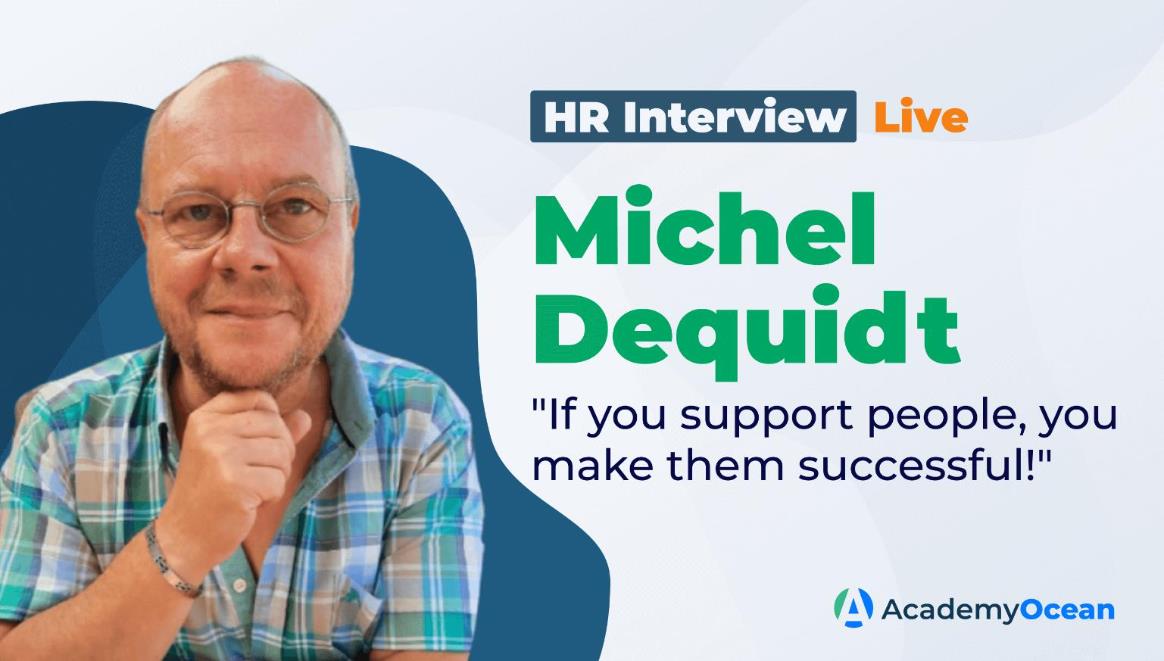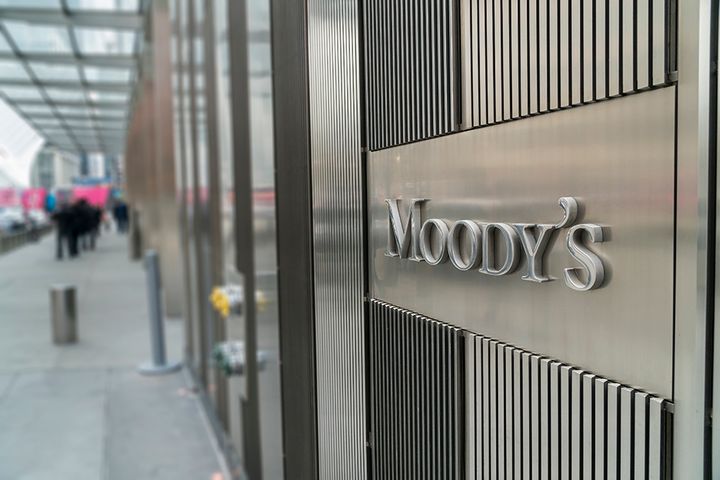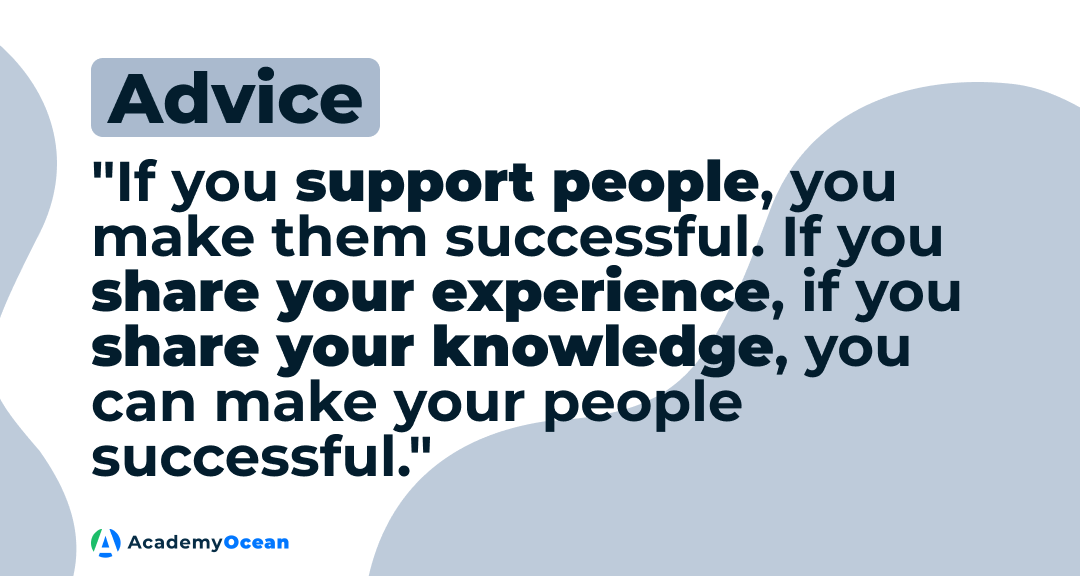Interview #19 Michel Dequidt: "If you support people, you make them successful!"

Good day, guys!
Due to our readers’ feedback, our series of interview blog posts is very useful, interesting and unique. We decided to improve it. Now you can not only read the opinions of HR specialists on various topics but also watch interviews online.
Yes, now some of the HR interviews will be in the video format 🤩
Today a door to our video interviews will be opened by Michel Dequidt, HR Business Partner at Moody's Corporation.

Michel is 62. He is specialized in HR matters, Business Analysis, Operating Models and Languages Teaching. For five years, he was Chief Corporate Officer at Front2Back Management Consulting, which he helped create in 2010. Michel was in charge of all Corporate Services in the company, ranging from HR Management to logistics, fleet management, administration, etc.
He grew as a Senior Manager specialized in the Financial Services Industry and total more than thirty years of work experience. He acquired extensive knowledge of long-term financial products while working as a senior dealer in a dealing room. Later Michel switched to a business and functional consultant position for a software vendor specialized in straight-through processing of stock exchange orders.
Since 2004, he has been an HR Manager, as a consultant first, then as an employee since 2018.
Moody’s Corporation is a globally integrated risk assessment firm that empowers organizations to make better decisions. Their data, analytical solutions and insights help decision-makers identify opportunities and manage the risks of doing business with others. They believe that greater transparency, more informed decisions, and fair access to information open the door to shared progress. With over 11,000 employees in more than 40 countries, Moody’s combines international presence with local expertise and over a century of experience in financial markets.

📌So, let’s start our interview. Read to the end to find out what kind of tool humanity will not be able to develop and how the onboarding of new employees was carried out in a full lockdown.
At the end of the article, a recording of our interview with Michel will be waiting for you.
AO: Hello. Nice to meet you, Michel. Welcome to our online AcademyOcean studio. We are glad you are the first HR taking part in our new video format interview.
M: Nice to meet you too!
AO: I decided to gather the most interesting and I think the most relevant question for this interview. So, let’s start from the beginning of your HR journey. Did you work somewhere before becoming an HR professional, why did you decide to become an HR?
M: Okay, I have worked in a dealing room for, actually, nearly 20 years as a dealer. I left the bank during a merger and I joined a company. Eventually, I did not choose to become HR. It was an accident. It was unexpected and I had never thought I would be interested in HR before. What actually happened is that I joined a company where I was the only one having experience in managing very big groups of people. It was not an experience, at least insights.
So that was the early 2000s. At that time, the company I was working for asked me whether I would be interested in becoming an HR BP. In the early 2000s, it was not common. Not at all.
It was very new to me. I was a consultant, the business management consultant in the banking and financial area. They asked me whether I would like to become the HR BP. I said yes because I thought it would be nice to know something new as a consultant. I mean, it's always interesting as a consultant to get new experience and new insides and new business pieces of knowledge, etc. Eventually, I thought this is an amazing thing to do because it is people-oriented.
After all, we care about retention, etc. So, from that moment, I never left HR. My career is actually two-fold, very much business, in the first half in the dealing room, which is a very interesting, but very harsh type of a job to HR, which is just contrary.
AO: So, actually you are happy that an accident gave you a chance to do what you love and to help people?
M: I loved both parts of my career very much. The first one was extremely interesting, but at the same time, it was very stressful. I did that until my 45th birthday, which is probably 10 years more than any dealer in any of the world's dealing rooms. I think it was time that I did something else. Well, by chance, I came across the opportunity of doing it deeper into HR. It is not just being a manager, but being interested in HR, HR and people's issues, etc. Two parts of my career are not related.
AO: Okay. You said your previous job was quite stressful. Now, can you tell me what difficulties do you usually face working as an HR? Because working with people is not quite easy as we all know.
M: It is always difficult. The most difficult part is when people come with very personal problems that you have to manage. After all, you can't rely on someone else because you got that confidentiality linked to your role. That one, you can talk about the issue and ask for advice or for finding any direction. Certainly, it's not difficult. It is so interesting, but at the same time, you have to be humble enough to recognize that you might not have the right solution for the person you're talking to because you can't be sure.
AO: Not only do you have to be an HR expert, sometimes you need to apply for the role of a psychologist.
M: As I have experienced, probably not since I became an HR, over the last 7 to 10 years is that HR has become more people-oriented and less process-oriented. When I started in HR, we talked about the staff and something like that, which has nothing to do with what we do nowadays in HR. There was no question about people's career evolution, career path, people's wishes.
There was no question of what is the effect of your daily tasks on your health? mental and physical.
I mean, as well as I do that over the last 15 years or so, burnout has become a very important problem within companies as a whole.
We are supposed to try and find tracks or solutions to have these people coming out of their problems because in most of the cases, problems originating from the company because there is more and more pressure on people to deliver the same quality, but in a very short period of time, which in my opinion, is not the best of ideas in terms of retention.
I think my job is to make the best possible conditions to work, make free from any other concern employees might have, and make sure they feel it.

AO: It seems to me that as an HR specialist you have really the right attitude to employees. And it’s worth a lot. Let’s move on to the onboarding and training. How does the onboarding of new hires go into your company?
M: I just joined the company less than two months ago. There is very little I can say about it because, when I joined and all others who joined ever since, March virtually, we all are working from home, but I think this is very efficient, really very efficient. It goes to the point where, on my very first day, all my hardware, etс. were home. In a moment of time, we could configure my laptop and everything and I was efficient from the first afternoon of my hiring, which is great because I know this is not an easy thing to manage. Definitely not in the case of virtual onboarding. We have done quite a lot. Secondly, there is a culture in this company of welcoming people.
It's quite easy when you are on the spot when you are at the office. It's seriously more difficult when it's happening virtually. I was very lucky that my boss organized that for me. She chose all the people I should meet in the very first days. Yeah, I think it's a very efficient onboarding process and I'm sure it's even more efficient than in normal times.
AO: And, Michel, how do you think the COVID-19 pandemic influenced the HR sphere and how HR aspects will change in 5 years?
M: For the next five years, what will become the most important feature of our activities is working remotely, providing the same service and the same quality of service that we can provide while we are at the office. The second thing is something that I already experienced. If we work more and more remotely, we'll need to address a mental health issue that we might have with some of our employees, some who cannot cope with confinement or lockdown fully. We, as HR, need to cope with that. We need to coach those guys and girls to find solutions to improve their working sphere.
AO: Okay, can you name one (or several) HR experts whose work do you highly appreciate?
M: I have some figures that I respect very much, but they are not especially involved in HR, not directly involved. I'm talking, for instance, about Jack Welch. He is a real mentor who has created a culture that is widely respected. Apart from that, I don't have any particular HR expert example.
My last two bosses, I mean the present one and the former one, are people I respect for their knowledge, their understanding, their flexibility, their empathy, and being people-oriented first. The business is always behind it. If you want your company to be successful, if you want to have as little turnover as possible, you need to make sure that your people are happy. It's not always possible to make them 100% happy. We know it because there are so many constraints in a company and the bigger the company, the bigger the constraints.
I think we, HR actually, over the last nearly 20 years evolved from an administration to service to individuals. And that makes a big difference.
I think we should go on like that and leave the administration to external providers. They do that very well. Okay. You've got to pay for them, but in the meantime, you can care about people, about their problems, about their careers, about their questions, about their aspirations. I mean, you can take care of lots of fields while you're not busy with administration and I mean soft skills versus hard skills.
I think the future is in soft skills because there is more and more pressure with globalization on individuals and we as HR needs to take care of that and we need to support the people, we need to advise them and support them.
I mean, there's a lot to do there, but I think we're going in the right direction. For the last, say 5 to 10 years maximum.
AO: Thank you, Michel, for such an inspiring answer. What is the most valuable professional development advice you have ever gotten? Maybe from your last boss or maybe from your parents?
M: That goes back long ago, and it's not related to HR. It's related to my former career as a trader. The most important advice I got there was that "If you support people, you make them successful. If you share your experience, if you share your knowledge, you can make your people successful." I think it's the most important thing to do because we all are longing to have a career and so on, but you have as a manager, for instance, to give them the chance to evolve, to make the most of themselves.
As an HR, I think you need to advise them. It would help if you pointed to their strengths. You need to point out their weaknesses and you need to give them solutions or at least tracks to their weak sides and make them very successful individuals.
That's advice I got from someone who was not in the HR field and I also wasn't in HR.

AO: I think it works in all industries!
M: Yes, it is transferable, obviously because, yes, we were speaking about people here. We're not talking about businesses, but we all know that businesses are looking for the same kind of profiles everywhere. We need people who are flexible, who are willing who are ambitious.
AO: Yes, I understand! Okay, Michel, and my last question is what do you think the types of tools will organizations use in the next year, especially HR?
M: Well, I think most of the online tools are already available. We're speaking about all administration tools. We are speaking about online evaluation tools, performance management tools, etc. I think that most of them are present nowadays already. We have tools that measure, although we have surveys, obviously, we don't really have a tool that measures people's commitment and satisfaction.
Let me take an example, performance management. Okay. We got tools that allow employees to make their own assessments. We have to save, allow the manager to respond, and get the quick one hour face-to-face. Then, you fill in all the forms, etc.
What I would expect from a tool is to give some added value to HR at this stage. I haven't found one very frankly, but I think that's what we should aim for, having tools that help us have a global view on each employee, to advise them in terms of career, in terms of mobility. I think that's the most important. What we lack as a tool is a tool that is soft skill-oriented. I don't think we will ever find one because you talk about human relationships when you talk about self skills. You talk about feelings. You talk about how I manage my career, how my manager expects my career to evolve, etc.
At this stage, I can't think of any such tool.
8 time-proved resources for hiring, onboarding, and managing remote development teams.
AO: Nice, thank you! That was the last question. I would like to thank you for this interview. I wish you and your parents good health!
M: I think it's the most important thing nowadays. We're all very concerned.
AO: I hope and think everything will be okay. Thank you, Michel!
Watch the full video interview here 👇
That's all for today, friends. See you at the next interview!
In case you would like to ask your own questions, write them down in the comments. Also, if you want to read an interview with a particular person, let us know.
Learn more about LMS 2.0 Platform for employee training.
Take care 😇